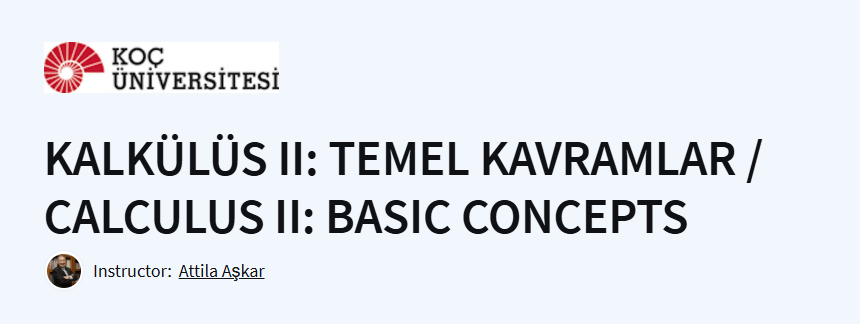What you will learn in KALKÜLÜS II: TEMEL KAVRAMLAR / CALCULUS II: BASIC CONCEPTS Course
- Master limits, continuity, and the formal definition of derivatives
- Learn differentiation rules (power, product, quotient, chain)
- Apply derivatives to optimization and related rates problems
- Understand the Fundamental Theorem of Calculus
- Develop problem-solving skills through practical applications
- Build a strong base for advanced mathematics and engineering courses
Program Overview
Limits and Continuity
⏱️ 3-4 weeks
- Limit definitions and evaluation techniques
- One-sided and infinite limits
- Continuity and Intermediate Value Theorem
- Limits at infinity
Derivatives
⏱️ 4-5 weeks
- Definition of derivative as limit
- Differentiation rules
- Implicit differentiation
- Higher order derivatives
Applications of Derivatives
⏱️ 4-5 weeks
- Mean Value Theorem
- Curve sketching (increasing/decreasing, concavity)
- Optimization problems
- Related rates
Introduction to Integration
⏱️ 3-4 weeks
- Antiderivatives
- Definite integrals and Riemann sums
- Fundamental Theorem of Calculus
- Basic integration techniques
Get certificate
Job Outlook
- Critical for:
- Engineering students (all disciplines)
- Computer Science fundamentals
- Economics and Business Analytics
- Physics and Applied Mathematics
- Career Impact:
- 85% of engineering jobs require calculus understanding
- Foundation for data science and machine learning
- Higher GPA correlation in technical programs
Explore More Learning Paths
Strengthen your calculus knowledge and prepare for advanced applications with these carefully selected courses designed to build a solid foundation in mathematical concepts and techniques.
Related Courses
-
Kalkülüs I: Hazırlık ve Altyapı / Calculus I: Precalculus Course – Learn fundamental precalculus concepts, functions, and essential mathematical techniques to succeed in higher-level calculus.
-
Kalkülüs III: Uygulamalar / Calculus III: Applications Course – Apply calculus concepts to multivariable problems, integration, and real-world scenarios for deeper mathematical understanding.
Related Reading
Enhance your learning process with structured improvement techniques:
-
What Is Performance Management? – Explore how systematic evaluation and goal-setting can help you approach complex calculus problems effectively and improve your problem-solving skills.
Specification: KALKÜLÜS II: TEMEL KAVRAMLAR / CALCULUS II: BASIC CONCEPTS Course
|
FAQs
- This is Part II, focusing on the core concepts of integration, complementing derivatives by exploring their inverse relationship with practical insight.
- Expect to spend around 11 hours total. The course is broken into several modules, including:
- Sequences, Series & Limits – ~5 hours
- Functions, Limits & Continuity – ~1 hour
- Derivative and Integral Foundations – ~2 hours
- Derivative & Integral Methods – ~2 hours
- Integral Computations (including trigonometric, singular integrals) – ~6 hours
- The course reorders traditional calculus teaching: instead of separating derivatives and integrals, it teaches them as complementary inverse processes, both grounded in limits.
- Emphasis is placed on understanding through computation, not memorization—highlighting how derivatives (subtraction/division) and integrals (addition/multiplication) converge via limiting processes.
- The sequences and series module includes multiple assignments and video explanations covering convergence, geometric series, power series, and Taylor series.
- Later modules similarly provide foundational and method-focused video content—supported by assignments—to build both theoretical understanding and computational skill.
Strengths:
- Offers a modern, intuitive framework, teaching calculus in a way that links fundamental concepts naturally, reducing fatigue and enhancing conceptual clarity.
- Concise and focused—ideal for reinforcing integration fundamentals quickly and effectively.
Limitations:
- Coverage is narrow—does not include advanced Calculus II topics like multiple integrals, parametric functions, or polar/coordinate systems.
- Lacks interactive software or computational tools; learning appears primarily video-and-assignment based.
- Perfect for students who need to reinforce or review core integration concepts, particularly focusing on conceptual clarity after introductory calculus.
- Serves well as a stepping-stone before progressing to more applied calculus topics like multivariable integration, differential equations, or dynamic systems.
- Pairs neatly with Calculus I (Precalculus) or Calculus III (Applications) in Koç University’s sequence.





